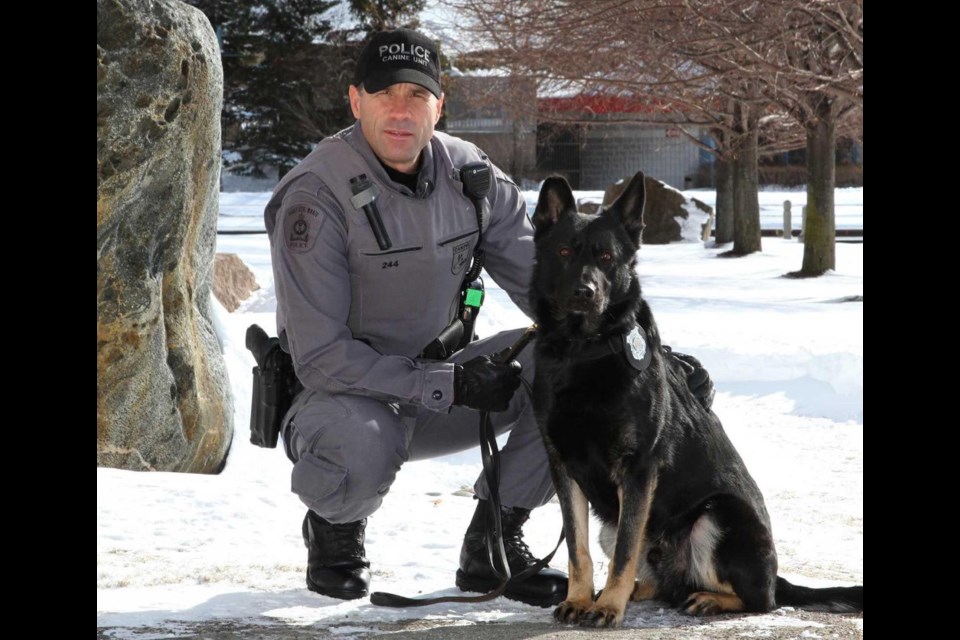Not every police officer gets to enjoy retirement and a relaxed life at home after only six to seven years of service.
But, as reported earlier by SooToday, Justice, the seven year old German shepherd brought on in 2012 to work as the Sault Ste. Marie Police Service dog, will be retired later this year or in 2019, to be replaced by a new dog.
More than one SooToday reader has contacted us, asking what will happen to Justice once he’s retired.
No need to worry.
“When it’s time for Justice to retire, probably sometime in 2019, he’ll continue to live with me and my family,” said Constable Dan Turco, Justice’s handler, speaking to SooToday.
Turco and Justice are the Sault Police Service’s canine unit.
“Working with Justice has been very rewarding,” Turco told us.
In fact, Turco, who has served with the Sault Ste. Marie Police Service for 23 years, said being a dog handler is simply the best.
“I’ve been very fortunate to have been able to work in various areas with the Sault Police, but I can say that working as the canine handler has been the most rewarding.”
“It’s very satisfying when we track and find an individual that may have just broken into a residence, searched through a wooded area and located a missing child, or found narcotics that were hidden in a residence. Those are the things we train every day for,” Turco said.
“Sure, there are times when a track is unsuccessful and you beat yourself up over it, wondering what you missed or where you went wrong. But, that is part of the job and you learn and you train to try to reduce those times.”
Police services are known to be tight knit communities, patrol officers having professional partners they enjoy working with, looking out for each other and developing strong friendships.
But, there is that extra special attachment between a police service canine handler and his/her police dog.
“Justice lives with myself and my family at my home. He has a kennel built in my backyard that he stays in when we’re not working. His dog house is heated in the winter and cooled in the summer. He’s very well taken care of,” Turco said of the royal treatment Justice the police pooch receives.
“Justice gets along great with my family, and he is a part of our family.”
“People develop a bond with their animals, which is very strong. The bond I have with Justice goes above and beyond that bond. It’s a bond that many don’t quite understand and very few will ever get to experience. Justice and I are together 24/7. Sometimes I think I spend more time with Justice then I do with my own family.”
As for the special requirements and training needed to be a police officer in charge of a police dog, Turco said “the greatest attribute I can tell you that a canine handler has to possess is commitment, especially here in the Sault because I’m the only canine handler.”
“Justice and I are on call 24 hours a day, seven days a week.”
“Officers can hang up their stuff and go home at the end of their shift. You can’t hang up a dog. We’ve been called out all hours of the day and night, called away from social gatherings and family events,” Turco said.
“The greatest thing I have is the support of my family. They know how much I love being a canine handler and how important it is to me to make sure I’m available at all times. My wife has never given me any grief when I leave for a call. She’s always been supportive, which makes things a lot easier.”
Justice, now nearly seven years old, began his training in September 2012.
At that time, the general service course was 16 weeks long, followed by another four weeks for narcotics and gun training.
Like every other form of police work, canine training has become more complex.
The training has evolved since 2012 and the general service course is now 18 weeks in duration, followed by six weeks for narcotics and gun training.
“Training doesn’t end there,” Turco said.
“Training is done every day. Just like an elite athlete, in order to perform at their peak level, they need to train all the time and a working canine is no different.”
Justice is trained in tracking human scent, whether from a criminal or looking for a lost person, capable of searching for people in a building, searching for articles or any evidence that may have been discarded, can detect eight types of narcotics, detect firearms and ammunition, and is trained in aggression and apprehension of criminals.
Turco will continue working with Justice while he trains a new canine with the OPP in southern Ontario beginning in August for a 130-day program, and the two will continue to make themselves available when they are able to come home to the Sault for short durations throughout the course.
“I haven’t really given much thought about working with a new canine partner yet. There’ll be new challenges to face again, but I believe I’ll be able to draw on the experiences I’ve acquired and apply those to the training of the new canine,” Turco said.
